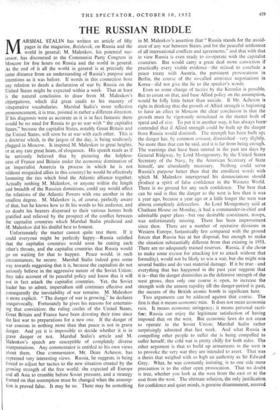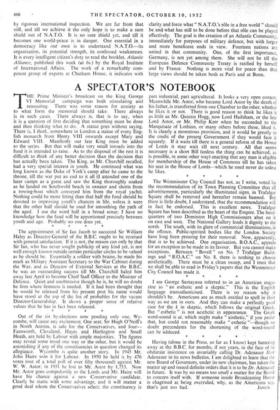THE RUSSIAN RIDDLE
MARSHAL STALIN has written an article of fifty pages in the magazine, Bolshevik, on Russia and the world in general; M. Malenkov, his potential suc- cessor, has discoursed to the Communist Party Congress in Moscow for five hours on Russia and the world in general. At the end of it all the world in general is at precisely the same distance from an understanding of Russia's purpose and intentions as it was before. If words in this connection bore any relation to deeds a declaration of war by Russia on the United States might be expected within a week. That at least is the natural conclusion to draw from M. Malenkov's objurgations, which did great credit to his mastery of vituperative vocabularies. Marshal Stalin's more reflective pronouncement, it is true, pointed in rather a different direction. If his diagnosis were as accurate as it is in fact fantastic there would be no need for Russia to go to war with " the capitalist States," because the capitalist States, notably Great Britain and the United States, will soon be at war with each other. This is a doctrine which, in the jargon of the day, is being studiously plugged in Moscow. It inspired M. Malenkov to great heights. or at any rate great heats, of eloquence. His speech reads as if he seriously believed that by picturing the helpless- ness of France and Britain under the economic domination of an imperialist Amercia (a process in which he is not without misguided allies in this country) he would be effectively loosening the ties which bind the Atlantic alliance together. Actually nothing M. Malenkov, or anyone within the length and breadth of the Russian dominions, could say would affect the relations of the Atlantic Powers with one another in the smallest degree. M. Malenkov is, of course, perfectly aware of that, but he knows how to fit his words to his audience, and no doubt his hearers dispersed to their various homes both gratified and relieved by the prospect of the conflict between the capitalist countries which Marshal Stalin predicted and M. Malenkov did his dutiful best to foment.
Unfortunately the matter cannot quite rest there. If it could everyone might be perfectly happy—Russia satisfied that the capitalist countries would soon be cutting each other's throats, and the capitalist countries that Russia would go on waiting for that to happen. Peace would, in such circumstances, be secure. Marshal Stalin indeed goes some way towards suggesting that it is, because the capitalists do not seriously believe in the aggressive nature of the Soviet Union; they take account of its peaceful policy and know that it will not in fact attack the capitalist countries. Yet, the Soviet leader has to admit, imperialism still continues effective and consequently the inevitability of war remains. M. Malenkov is more explicit. " The danger of war is growing," he declares unequivocally. Fortunately he gives his reasons for entertain- ing that conviction; the ruling circles of the United States, Great Britain and France have been devoting their time since the last war to preparations for a new one. If the danger of war consists in nothing more than that peace is not in grave . danger. And yet it is impossible to decide whether it is in grave danger or not. Marshal Stalin's article and M. Malenkov's speech are susceptible of completely diverse interpretations. Any commentator is entitled to his own views about them. One commentator, Mr. Dean Acheson, has expressed very interesting views. Russia, he suggests, is being forced to adjust her tactics to the new situation created by the growing strength of the free world; she expected all Europe and all Asia to crumble before Soviet pressure, and a strategy framed on that assumption must be changed when the assump- tion is proved false. It may be so.. There may be something in M. Malenkov's assertion that " Russia stands for the avoid- ance of any war between States, and for the peaceful settlement of all international conflicts and agreements," and that with that in view Russia is even ready to co-operate with the capitalist countries. But would carry a great deal more conviction if practically every visible evidence—the refusal to conclude a peace treaty with Austria, the persistent provocations in Berlin, the course of the so-called armistice negotiations in Korea—did not give the lie to the speaker's words.
Even so some change of tactics by the Kremlin is possible. But to count on that, and base Allied policy on the assumption, would be folly little better than suicide. If Mr. Acheson is right in thinking that the growth of Allied strength is beginning to have an effect in Moscow the clear conclusion is that the growth must be vigorously stimulated in the matter both of speed and of size. To put it in another way, it has always been contended that if Allied strength could be built up the danger from Russia would diminish. The strength has been built up; the danger has, by common consent, diminished—very slightly. No more than that can be said, and it is far from being enough. The warnings that have been uttered in the past ten days by General Ridgway, by Lord Montgomery, by the United States Secretary of the Navy, by the American Secretary of State himself, are abundantly necessary. Nothing could serve Russia's purpose better than that the emollient words with which M. Malenkov interspersed his denunciations should produce a spirit of false confidence in the Western World. There is no ground for any such confidence. The best that can be said is that the danger to the west is less than it was a year ago, because a year ago or a little longer the west was almost completely defenceless. As Lord Montgomery said at Chatham House on Monday, it had a commander-in-chief and admirable paper plans—but one desirable constituent, troops, was unfortunately missing. There has been improvement since then. There are a number of operative divisions in Western Europe, fantastically few compared with the ground forces that Russia has at her disposal, but enough to make the situation substantially different from that existing in 1951. There are no adequately trained reserves. Russia, if she chose to make some excuse for attacking (or to attack without that formality), would not be likely to win a war, but she might win several battles and do vast material damage. If it be true—and everything that has happened in the past year suggests that it is—that the danger diminishes as the defensive strength of the west grows, then only one course is open, to increase the strength with the utmost rapidity till the danger-period is past; the success of the British atomic bomb is significant here.
Two arguments can be adduced against that course. The first is that it means economic ruin. It does not mean economic ruin. It means economic stringency; it means personal sacri- fiee; Russia can enjoy the legitimate satisfaction of having imposed that on the west. But economic laws do not cease to operate in the Soviet Union; Marshal Stalin rather surprisingly admitted that last week. And what Russia is compelling other people to suffer she is being compelled to suffer herself; the cold war is pretty chilly for both sides. The other argument is that to build up armaments in the west is to provoke the very war they are intended to avert. That was a thesis that weighed with so high an authority as Sir Edward Grey. What, he was constantly insisting, is to one side mere precaution' is to the other open provocation. That no doubt is true, whether you look at the west from the east or at the east from the west. The ultimate solution, the only justification for confidence and quiet minds, is genuine disarmament, assured by rigorous international inspection. We are far from that still, and till we achieve it the- only hope is to make a sure shield out of N.A.T.O. It is no sure shield yet, and till it becomes one world-peace is in danger. One essential in a democracy like our own is to understand N.A.T.O. its organisation, its potential strength, its confessed weaknesses. It is every intelligent citizen's duty to read the booklet, Atlantic Alliance, published this week (at 6s.) by the Royal Institute of International Affairs. The work of a remarkably com- petent group of experts at Chatham House, it indicates with clarity and force what " N.A.T.O.'s role in a free world " should be and what has still to be done before that role can be played effectively. The goal is the creation of an Atlantic Community, immediately for purposes of military defence, but with larger and more beneficent ends in view. Fourteen nations are united in that community. One, of the first importance, Germany, is not yet among them. She will not be till the European Defence Community Treaty is ratified by herself and by France. Nothing is more vital for peace than that large views should be taken both at Paris and at Bonn.



































 Previous page
Previous page